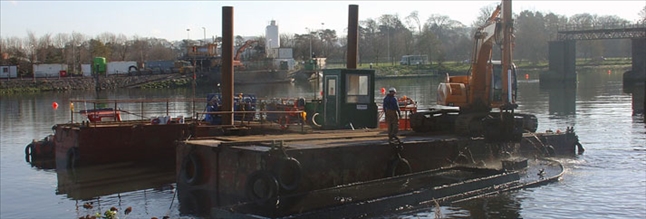
Doran Consulting was commissioned by the Department for Social Development (DSD) to act as lead consultant on this major maintenance dredging and environmental improvement scheme, on the River Lagan, Belfast.
After a series of detailed hydrographic surveys of the river, it was evident that an extensive programme of dredging was required in order to maintain the minimum navigable depth. The areas where siltation had occurred were identified and the material to be dredged tested physically and chemically so that the appropriate means of safe disposal could be determined.
After extensive detailed discussions with the Northern Ireland Environment Agency (NIEA), it was decided to programme the works so that dredging would not be carried out between the months of April and September when migratory fish runs occur. During this period, low river flow conditions and higher water temperatures combine to cause a reduction in water quality, particularly the amount of dissolved oxygen content that is an important factor in sustaining aquatic life. There was concern too that sediment disturbed during dredging would be potentially damaging to fish life.
This particular section of the river is in an established residential area of the city and is extensively used by athletes for rowing and by small businesses for tourism. The works therefore had the potential to have a disruptive impact upon these river users and local residents. However, we worked closely with the river users’ forum and local residents groups to tailor the project to reduce the impact of the work as much as possible on the river users, residents and businesses, whilst also taking necessary measures to safeguard any tourists and athletes continuing to use the river in the vicinity of the works.
Nearly 90,000 tonnes of silt were dredged from the river and disposed off at sea, under a licence issued by the NIEA. The spoil material was transported down the river from the dredge site on small barges and transferred to a large sea-going barge to be carefully discharged at sea. Disposal of the material to sea via waterways avoided the need for numerous lorry movements of wet silt along narrow city streets with the associated disruption to local riverside communities.
In addition, on behalf of DSD we entered the project in the CEEQUAL Award Scheme and undertook the role of assessor, achieving a “Very Good” Whole Project Award.